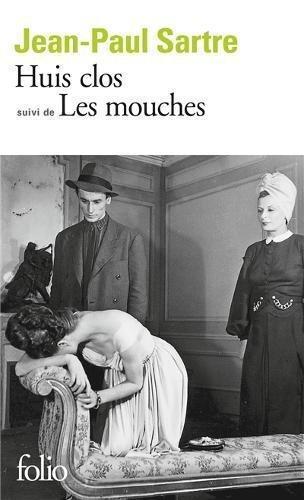Julia_98 reviewed Huis Clos, suivi de Les Mouches by Jean-Paul Sartre
Freedom in the Shadow of Guilt – My Reading of Sartre’s The Flies
5 stars
Reading Jean-Paul Sartre’s The Flies was for me like standing in a dark square, listening to voices that echoed both fear and defiance. The play, Sartre’s reimagining of the myth of Orestes and Electra, struck me not only as a retelling of a Greek tragedy, but as a profound meditation on freedom and responsibility in a world paralyzed by guilt.
From the moment Orestes returns to Argos, I felt the oppressive weight of the city, haunted by the flies that symbolize decay and remorse. The people live crushed under the authority of King Aegisthus and the manipulations of Jupiter, convinced that their sins demand eternal punishment. I was deeply moved by how Sartre captured this suffocating atmosphere—it reminded me of how fear can keep entire societies silent and submissive.
What stirred me most was Orestes’s awakening. His decision to kill Aegisthus and Clytemnestra is not just an act …
Reading Jean-Paul Sartre’s The Flies was for me like standing in a dark square, listening to voices that echoed both fear and defiance. The play, Sartre’s reimagining of the myth of Orestes and Electra, struck me not only as a retelling of a Greek tragedy, but as a profound meditation on freedom and responsibility in a world paralyzed by guilt.
From the moment Orestes returns to Argos, I felt the oppressive weight of the city, haunted by the flies that symbolize decay and remorse. The people live crushed under the authority of King Aegisthus and the manipulations of Jupiter, convinced that their sins demand eternal punishment. I was deeply moved by how Sartre captured this suffocating atmosphere—it reminded me of how fear can keep entire societies silent and submissive.
What stirred me most was Orestes’s awakening. His decision to kill Aegisthus and Clytemnestra is not just an act of vengeance, but a declaration of human freedom: the refusal to accept guilt imposed from outside. As I read, I could feel the shift from despair to empowerment, as if Sartre were whispering that true liberty comes only when we assume the weight of our choices.
The Flies left me unsettled yet inspired. It is not a play of easy catharsis, but of confrontation: with authority, with fear, and ultimately with ourselves. For me, it remains a stark reminder that freedom always carries the burden of responsibility.

